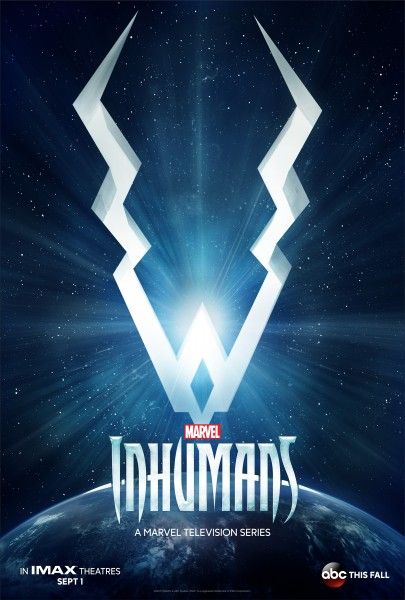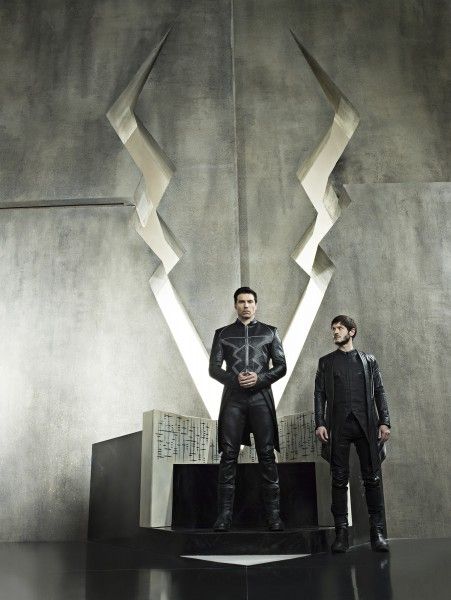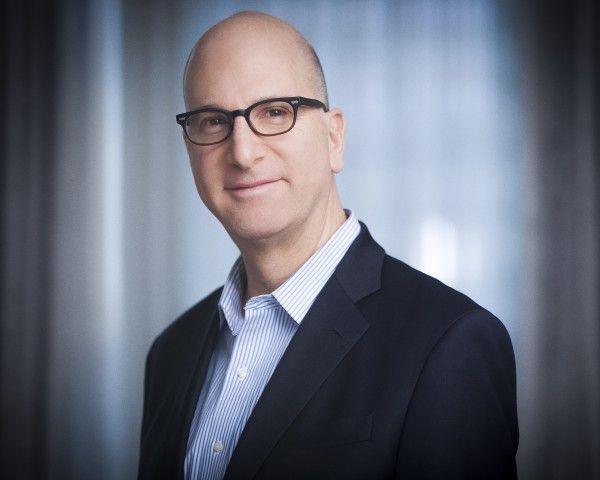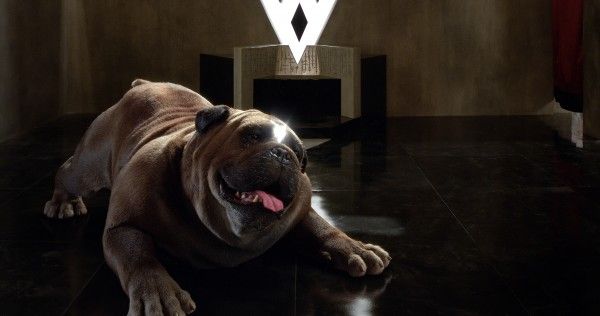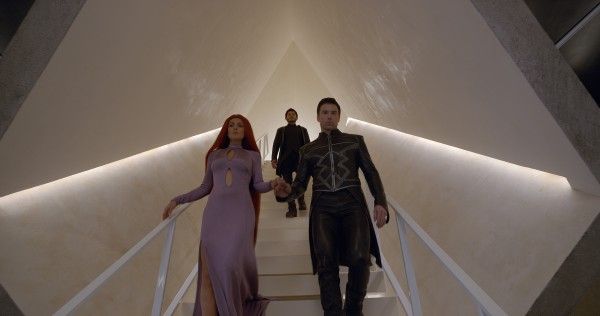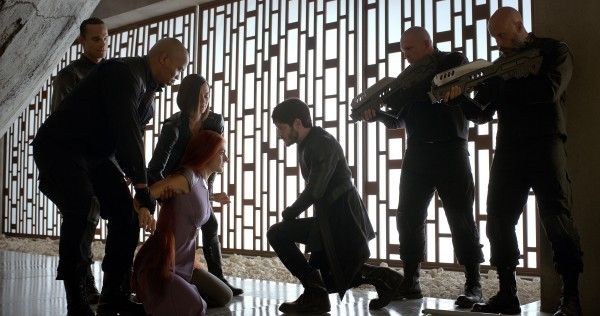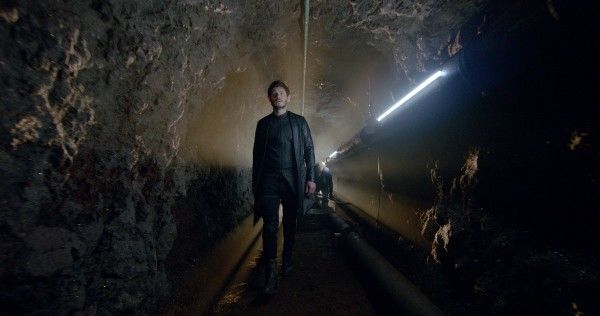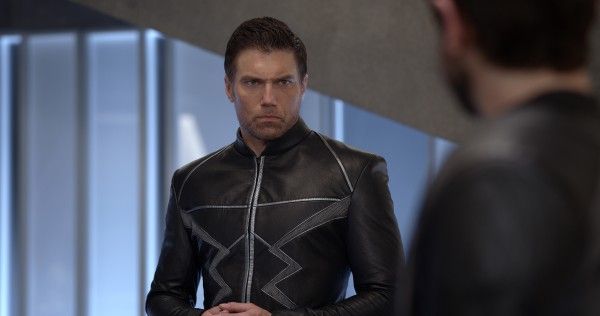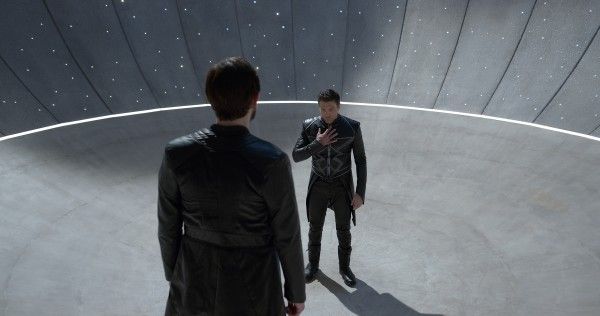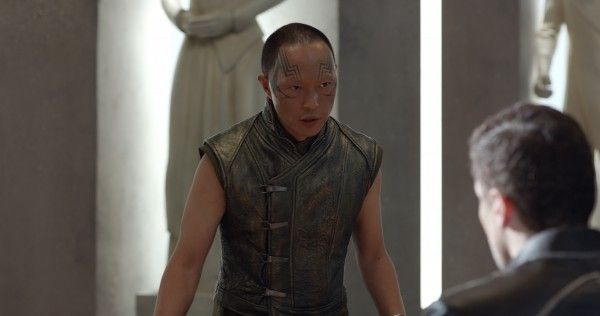When Marvel’s Inhumans was filming earlier this year in Hawaii, I was able to visit the set with a few other reporters, where we watched filming and talked to most of the cast and filmmakers. I learned a lot about the upcoming show and over the next month, I’ll be posting a lot of cool content revealing how the show came together and what fans can look forward to.
If you’re not familiar with the series, based on the Marvel comic, it’s doing something incredibly cool and unusual. The first two episodes were filmed using IMAX cameras and will premiere globally in IMAX theatres for a two-week period, beginning September 1, 2017, and then ABC will air the entire eight-episode series beginning September 29th. It’s an incredibly ambitious idea, but one I can’t wait to see.
While on set, I got to participate in a group interview with IMAX Entertainment CEO Greg Foster. During the interview, Foster talked about how and why they decided to invest in this production, how they are going to measure the success of the show, the way Game of Thrones playing in IMAX influenced Inhumans, the complicated deal with Marvel and ABC, and so much more.
Finally, before getting to the interview, check out the first teaser trailer for the series followed by the official synopsis:
-
“Marvel’s Inhumans” explores the never-before-told epic adventure of the royal family including Black Bolt, the enigmatic, commanding King of the Inhumans, with a voice so powerful that the slightest whisper can destroy a city. After the Royal Family of Inhumans is splintered by a military coup, they barely escape to Hawaii where they are greeted with surprising interactions with the lush world and humanity around them. Now they must find a way to reunite with each other and return to their home before their way of life is destroyed forever.
-
“Marvel’s Inhumans” stars Anson Mount as Black Bolt, Iwan Rheon as Maximus, Serinda Swan as Medusa, Eme Ikwuakor as Gorgon, Isabelle Cornish as Crystal, Ken Leung as Karnak, Ellen Woglom as an undisclosed character, Sonya Balmores as Auran and Mike Moh as Triton.
-
The series is executive produced by Scott Buck, along with Marvel’s Jeph Loeb and Jim Chory with Buck serving as showrunner. Roel Reiné directed the first two episodes. This series is a Marvel and IMAX project and is co-produced by Marvel Television and ABC Studios.
-
Question: Can we sort of talk about the genesis of this project, and because this is your first time, I believe investing as a company, in production like this?
GREG FOSTER: So, it is, and the genesis of it is multi-layered, so I'm just gonna ramble for a bit. First of all, our goal is to provid- IMAX's goal is to provide 52 weeks of compelling content, and the reality is that big tent pole, blockbuster movies, which is how we now make our living, do not come out 52 weeks of the year. I'm going to use North American dates, my apologies, but right around Labor Day, which is sort of end of August, early September, studios don't release big movies. I still can't quite figure out why, but they don't. They didn't use to release big movies in January, but now they do, because American Sniper did so well. So, all of a sudden, that religion is over, and now they will release big movies then, but they don't release them in September. They don't in early September. They don't release them post Thanksgiving, pre Star Wars, which means the first two weeks of December. They don't release them Super Bowl Sunday week. They don't release them at the end of April. It's just how it works, but an exhibitor who's in the IMAX business, doesn't care. So, Pathé or Toho, or AMC, or Regal, they don't really care that studios don't release big time, full blockbuster movies during eight to ten weeks a year. What they care is that they have their biggest grossing screens, which are IMAX screens, and the most trafficked multiplexes, don't have new product.
Our business last year, did about a billion dollars, because our network has grown. We're in 74 countries, and because we're such an important part of what goes on with movies. So, for instance this weekend, with Beauty and the Beast, which is a family movie, and not something that traditionally IMAX would do, we did 21 million dollars at the box office. So, they have to have product. So, we thought, well television is the lines between television and movies, those lines are blurring. In fact, I would pause it that they've blurred, and we have an incredible relationship with Marvel, and have for a long time. We have an amazing relationship with Disney. Maybe there's something to that. So, we started talking and this came about, and it's something, as you just saw, is being designed and customized to take advantage of the IMAX footprint, the IMAX scope. It's a television show. It's not a movie, but it's a television show with incredibly high production value, that features a lot of things futuristically, and in space, which lends itself to IMAX, and it's got this window, and the window happens to conspicuously be when we don't have big studio movies. That's the ultimate genesis of it. It's been an eye opener on a lot of different levels.
There's another part of it, that I think is important to talk about, which is, we have been judged, for lack of a better expression, as a capital markets company, as a publicly traded company, actually two of them, as an exhibitor, and mostly as a North American exhibitor. So, the way our business is evaluated, is under the auspice of being a North American exhibitor, but we're in 74 countries. We have 1,200 screens. We have another 500 that are in back log, meaning they've been contracted, but they haven't opened yet, and we feel that we're a multifaceted media and technology company.
So, being now in the television business for the first time, and doing so with something that has such scope, and is with a connection, the Marvel IMAX Disney connection, ABC is obviously a Disney company, Marvel is a Disney company. We've had an outstanding relationship with everything Disney, and everything Marvel for quite some time, and to do so in a way that again, fills in this conspicuous absence of big studio product. September, for the first couple weeks, just made it too good to pass up. So, we didn't.
I have a question with regards to how you measure the success of this project. How would you measure the success of it?
FOSTER: So, ultimately the success of the property is, if the television show works. Our goal is, see it first in IMAX, and have the audience that IMAX has spent many years building, which is the fanboy audience, have that audience-
Fangirl.
FOSTER: Or fangirl. It's fans, but no offense, but it's usually ... We are a little bit more fanboys, than fangirls, but maybe with something like Beauty and the Beast, we're seeing that that's shifting a little bit, which we're excited about ... Really excited about. The goal is for the television show, when it premieres in the Fall, on ABC, and all of the various broadcast platforms in your countries, to be able to bring incremental traffic to watching it on television, that might not have come, were it not for the fact that it was affiliated with IMAX. That's how we ultimately are gonna be judging. That's how we'll judge ourselves.
We do expect the box office in that two week window, starting September 1st, to be better than anything else that we would have released September 1st. Because if you go back and look at what our schedule has been on September 1st over the last three or four years, or more or less September 1st, it was a re-release of Indiana Jones. It was a re-release of The Wizard of Oz. It was when we had our first DMR title, it was in September and it was the re-release seven years after it came out originally of Apollo 13. These movies are being re-released in IMAX, because there's really, again, nothing there for the studio.
So, our goal, how we will determine success, is to generate some box office. We think it will, and as we've seen from the social media trending, that's come out with a release of the cast, with some of the paparazzi that's seeing things in Honolulu, that got online, with the fact that this is something. It's connected to Marvel obviously. It's Marvel IP, that there's a built in fan base. Ultimately, we want it to be a success on the network, but we'd also like to be able to generate this new business opportunity, because we are a publicly traded company, and it's our goal to have more people come to movies than traditionally come to movies, or come to movie multiplexes. I hope that answers the question.
With regards towards the development that you are doing here, with the technology, but also the fact that you're putting this onto television, and using it in movie theaters, and what you said about the market as a whole. Are you leading the market, or is the market leading you? Which is it? It's kind of chicken and egg.
FOSTER: It's a really good question, and the only I can answer it is, there was a fork in the road that IMAX went through somewhere around 2000 ... Something just disconnected of something. Somewhere between 2006 and 2008, and this is actually a really, really important thing. We changed our business model, and became more of a joint venture business model, that instead of selling people things, and telling them that they had to do it our way. We said, "We're gonna give it to you, but in return, we're gonna ask you to tell us what you want, and then it will be incumbent upon us to deliver that."
So, examples ... We went from film to digital. We went from selling our theaters, to giving them our theaters in a joint venture model. We grew our network exponentially. In 2008, we released the last film only movie, which was the original Dark Knight, where Chris Nolan shot about 30 minutes in IMAX cameras. When that came out, our company at the time, was 41 years old, and that came out in 147 IMAX screens. We had not gone digital yet. We had not changed our business model to a joint venture model. Four years later, our company is 45 years old, and we release The Dark Knight Rises. It was released on 605 screens. So, it took us 41 years to get 147 screens. We changed our mentality. Let's be better partners and ask them what they want, and then deliver that to them, instead of telling them, "You have to do it this way. You have to do it this way. You have to do it this way, if you want to be in IMAX."
So to me, going back to your question, the market dictated to us that we needed to create 52 weeks of compelling content. Instead of making a movie, we decided to take advantage of the marketplace, and the fact that, not coincidentally, television shows tend to premiere in the Fall. So, why not do this in a way that helps propel that television show into a different hemisphere, and all of the people at ABC, Mike included, and his team, and obviously ABC and Marvel, have all said, "Our goal with IMAX's inclusion is to be able to bring some of those IMAX fans ..." I'll be gender neutral. "To bring some of those IMAX fans, to ABC, to the broadcast partners." So, I think that it's as much of them coming to us, as it is us coming to them.
Can you talk a little bit about how the Game of Thrones event screenings did or didn't influence this project?
FOSTER: Oh, it heavily influenced. So first of all, our website crashed twice, because we first announced it. For those that don't know, Game of Thrones played in IMAX, Super Bowl Sunday weekend. This is two years ago. So, two years and a month ago. It played with two episodes that were strung together, that were six months old, that had already played on HBO, and were available to be screened, six months in advance. So, very few people who were fans of Game of Thrones hadn't seen it yet, and we attached to it, about three minutes of footage from season five. We were episodes nine and ten of season four, and when we announced it first, we announced it for 100 of our screens. Only a hundred. No international at all. Only a hundred in North America. Our website crashed. Then about two weeks later, we announced that we were adding another hundred, our website crashed. So, it heavily influenced our decision, and as much as we love this partnership, and we do, we know that we're not only gonna do, in perpetuity Marvel shows, and I will tell you that as exciting as this is, and Marvel has for all intents and purposes, a first option with what we do, because they're pioneering with us.
When Game of Thrones was announced and after it happened, a lot of people come to us and say, "We want to do this." I don't have to name the broadcast networks or the streaming companies. You know who they are. All of the biggest ones. We had an opportunity to do something that we were pretty far along with, about six months before this project, and we elected not to. The reason we elected not to, is we didn't think it had ... We didn't have the pre-existing relationship, and it didn't have the sexiness of what a Marvel property does. So, we waited, and this happened. So, Game of Thrones heavily influenced it, but the business model has gotten better for this, and the opportunity to really propel the show, I think has gotten better, because we're not repurposing old content.
I haven't mentioned this, but obviously it's critical, especially for these two episodes. The episodes have been designed, as you just saw, with IMAX in mind, is using the IMAX RE Alexis 65 cameras, not a coincidence. It's being framed for IMAX, not a coincidence. It doesn't work for us, and it won't work for Marvel or ABC, if we don't bring something to the party. If we aren't able to create something incremental, that you can only get with that theatrical IMAX release of the television property. It's kind of, what's the point? We don't want to do it just to try, and it's not just about drawing a new business. You're not gonna be able to sustain that business, if you can't actually provide something incremental, that they can't get, movie goers or television goers, or content consumers, which is really what this is about, can't get anywhere else. What we do, IMAX's secret sauce is we take them and make them better. That's really what we do.
Those theaters, your Pathé theaters- They're great, but we've taken your Pathe' theaters, and added our screen, and it's become the hub, the anchor, of that complex. The cameras ... It's an Arri Alexa 65 camera, it's an outstanding camera. By using more of the information that the camera can provide on the chip, we've made it better. By using our sound, which will be mixed to our 12.0 sound, we're making it better. So, that's what we do. The projectors ... They're not IMAX projectors. They're Barco or Christie, or Sony, or whomever's projectors that we take, and add our secret sauce to it, and all of a sudden they become better. The laser technology of our projectors, our laser projectors, we bought those IP, that IP from Kodak, and then we made it better. So, that's the genesis of who we are. We take what other people have done, we partner with them, and we make them better, and together the partners and ultimately the consumers, experience something that is revved up, enhanced, consumer content viewing.
Streetwise, what were the concerns that you had to make this these two episodes become appealing for the TV-goers to become movie-goers, and how do they end a story or are they origin?
FOSTER: Right. So, they're not movie-goers, they're people who are, again, consuming content. So, this is not going to be two hours. But your question is the right question. I think it really boils down to the content lends itself. The IP lends itself to IMAX. It involves space. It involves these extraordinary locations, part of what you're seeing in Hawaii. It involves special effects like you’ve seen with Lockjaw and some of the other things you’ll see later on. It also has the right people making these pieces of content, so Jeph Loeb, who unfortunately isn’t here today, but started as a movie guy, became a television guy, has been on — you’ll see his bio, if you haven’t already — some incredible shows. Marvel shows, Lost, etc. He’s a big idea guy and so Jeph is part of it. Scott’s definitely part of it, who you’ve already met. Roel [Reine] is part of it. If you look at his Dutch movies — The Admiral, etc. — you’ll see that he thinks big. He’s also someone, he’ll tell you when you meet with him, he’s a big fan of IMAX. He’s a cinematographer by trade. That was very important to us. So, it has to be from a story point of view, from a location point of view, from a production tools point of view IMAX-centric, or it makes no sense. So, it would not make sense to do Modern Family in IMAX. Just like it doesn’t make sense to do Sleepless in Seattle in IMAX.
What about La La Land in IMAX?
La La Land had some unbelievable production value to it, some incredible production value to it. You’ll notice that La La Land came out in IMAX after-the-fact, in a slow period, in the end of January.
Thank you for that.
And, by the way, how did it do?
Really well. I went to see it twice.
That’s a perfect… you walked right into that. That’s a perfect example of why these absent Hollywood blockbuster titles can find a window in IMAX that didn’t exist before because we have these kind of dry times, these down periods of time in our schedule. So we can either rely on people to give us footage or films or television shows that have already been seen. Or, because we’ve had some success recently, we can make the biggest financial commitment we’ve ever made to original content and create them with our partners at Marvel and ABC ourselves. And that’s what we feel is the future. Are we going to be doing this six or seven times a year? Absolutely not. Are we going to be doing this — and this is really, really important — competing against ourselves, against Star Wars or against… no of course not. Why would we ever do that? We’re only filling in gaps. We’re doing this when there aren’t big tentpole blockbuster movies. So there’s really only three or four or five windows for a couple weeks at a time when we can do this. We can repurpose old titles or we can help create new titles.
Everything is about numbers. How do you come up with a number, as far as a risk and an investment, that’s something you’re comfortable with, but that isn’t restricting. What the math?
You’re right that, ultimately, it’s going to boil down to a business model working, but that’s not the case in the beginning. Just like it wasn’t the case in the beginning with the DMR titles that we did. Because we didn’t have a network that could justify it. It was more about creating buzz, enhancing the value of the property, making the show work, etc.
We do think there is a great business model for this, but — I don’t think this is going to be the case, I’m hopeful that this is not the case — let’s say this only lasts for one season… We will not make money, but we’ll be thrilled that we did it. Because we want to experiment. This is a test. It’s the most expensive test we’ve ever had. Are we betting our company on it? Absolutely not. If it doesn’t work, it’s a big test, but it’s not a bet the farm.
Really, where we’ll know if the math works, is if it gets to Season 2 and then really when it gets to Season 3. And I’m not saying anything that we haven’t already said publicly, we’ll lose money if it only lasts Season 1. We’ll kind of break even, more or less, if we get to Season 2. We’ll start really generating some money — mostly ABC and Marvel will start really generating some cash flow — if it get to Season 3 and beyond. And we’re just along for the ride. What we’ve bet on is our partnership and the presentation that our network of 1200 screens that, last year, had a 160 new screens installed and 319 new deals made.
When we have a new theater, it doesn’t open that moment. It can open anywhere from the next week to three or four years later. So, we grow at about 160 screens, if you look at the last year or two, annually. So, if we do nothing, in three or four years, we’ll have 1700 screens. Again, remember, in 2008, we had 147. So, this new advent into the fandom of big tentpole blockbuster movies — not to mention the fact that we changed the business model and made it easier to be in the IMAX business — is something that we pay an awful lot of attention to it.
How complicated was it figuring out the deal and the money you wanted to spend because, generally speaking, when a movie comes out, a certain amount goes back to the studio? You guys are investing a lot of money, but then it’s gonna come out theatrically for two weeks, and the percentage that you guys get back needs to figured out, but then it goes to TV and Blu-ray. Is IMAX a full owner of this show?
The deal was extremely complicated. My advice to you would also be to go look at some of the articles that have already been written on this business proposition and you’ll see Rich, who is my boss, who is the CEO of IMAX Corporation. I’m the CEO of IMAX Entertainment. I work for him. He has been incredibly involved in the details of this. As has our CFO, as have I, as has my Executive Vice President. As has Mike’s boss. And the people way on up at ABC and Marvel. It was not an easy structure to make. That’s what’s so fun about it. It’s different. This has never been done before.
You guys, I can say this with my hand on my heart, you guys are the first people to ever visit, first press to ever visit, a television show that’s premiering on IMAX ever in the world. This is different. That’s what makes this so fun. There are no rules. We get to create them. It’s easier to create rules in partnership with someone, with another company, that you have a connection with. We have a connection with Marvel. It is not a coincidence that these two companies, with our bigger partnership even with Disney, which is under their umbrella, the ABC umbrella. It’s not a coincidence. But it’s a pilot. We’re trying it. It’s a test. But it’s exciting.


